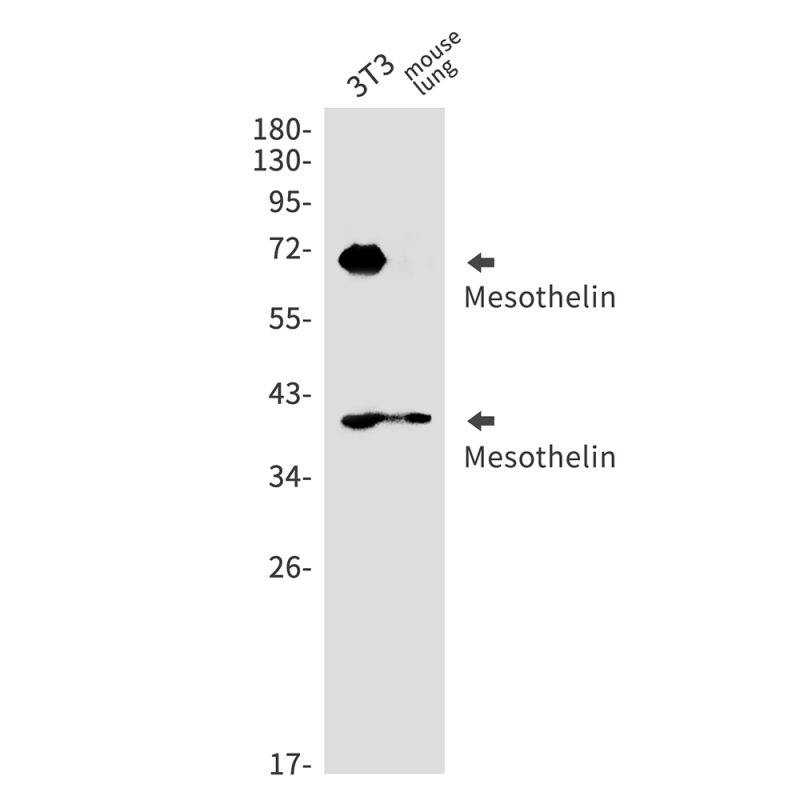
| WB | 1/500-1/1000 | Human,Mouse,Rat |
| IF | 1/20 | Human,Mouse,Rat |
| IHC | 咨询技术 | Human,Mouse,Rat |
| ICC | 技术咨询 | Human,Mouse,Rat |
| FCM | 咨询技术 | Human,Mouse,Rat |
| Elisa | 咨询技术 | Human,Mouse,Rat |
| Aliases | Pre-pro-megakaryocyte-potentiating factor; MPF |
| Entrez GeneID | 56047 |
| WB Predicted band size | Calculated MW: 70 kDa; Observed MW: 40,70 kDa |
| Host/Isotype | Rabbit IgG |
| Antibody Type | Primary antibody |
| Storage | Store at 4°C short term. Aliquot and store at -20°C long term. Avoid freeze/thaw cycles. |
| Species Reactivity | Mouse |
| Immunogen | Recombinant protein of mouse Mesothelin |
| Formulation | Purified antibody in TBS with 0.05% sodium azide,0.05%BSA and 50% glycerol. |
+ +
以下是关于Mesothelin抗体的3篇代表性文献摘要:
---
1. **文献名称**:*Mesothelin-Targeted Immunotoxin SS1P in Cancer Therapy*
**作者**:Hassan, R., Pastan, I.
**摘要**:研究报道了一种靶向Mesothelin的免疫毒素SS1P(由抗Mesothelin抗体片段与假单胞菌外毒素融合),在间皮瘤和卵巢癌模型中显著抑制肿瘤生长,为后续临床试验奠定基础。
2. **文献名称**:*Development of a Humanized Anti-Mesothelin Antibody for Targeted Therapy*
**作者**:Bera, T.K., Pastan, I.
**摘要**:通过人源化改造小鼠源性抗Mesothelin抗体,降低了免疫原性并保留了高亲和力,为实体瘤的抗体药物偶联物(ADC)开发提供了新策略。
3. **文献名称**:*PET Imaging of Mesothelin-Expressing Tumors with 89Zr-Labeled Antibody*
**作者**:Ho, M., et al.
**摘要**:利用锆-89标记的抗Mesothelin抗体(如MORAb-009)进行正电子发射断层扫描(PET),成功实现胰腺癌和间皮瘤的肿瘤特异性显像,验证其诊断潜力。
---
**备注**:以上文献多来自Pastan团队(美国国立癌症研究所),他们在Mesothelin抗体治疗和诊断领域具有开创性贡献。如需具体发表年份或期刊信息,可进一步补充。
Mesothelin, a cell surface glycoprotein encoded by the *MSLN* gene, is a tumor-associated antigen that has garnered significant attention in cancer research and therapeutics. Normally expressed at low levels in mesothelial cells lining body cavities, mesothelin becomes overexpressed in several aggressive malignancies, including malignant mesothelioma, ovarian cancer, pancreatic ductal adenocarcinoma, and certain lung cancers. This restricted expression in healthy tissues and upregulation in tumors make it an attractive target for antibody-based therapies and diagnostic tools.
Mesothelin antibodies are engineered to bind specifically to mesothelin, enabling diverse applications. In diagnostics, they aid in tumor detection and histopathological classification. Therapeutically, they form the basis for multiple strategies: (1) Antibody-drug conjugates (ADCs), where cytotoxic agents are delivered directly to tumor cells; (2) CAR-T cell therapies, utilizing mesothelin-targeting domains to redirect immune cells; and (3) Immunotoxins, combining antibodies with bacterial toxins to kill cancer cells. Notable examples include amatuximab (MORAb-009) and anetumab ravtansine, which have undergone clinical trials with mixed but promising results.
Challenges persist, including tumor heterogeneity in mesothelin expression and on-target/off-tumor effects due to low-level mesothelin in normal tissues like pericardium. Current research focuses on improving antibody specificity, developing bispecific antibodies, and exploring combination therapies with chemotherapy or immune checkpoint inhibitors. Advances in antibody engineering and biomarker-guided patient selection continue to refine mesothelin-targeted approaches, positioning these therapies as potential game-changers for mesothelin-positive cancers with limited treatment options.
×